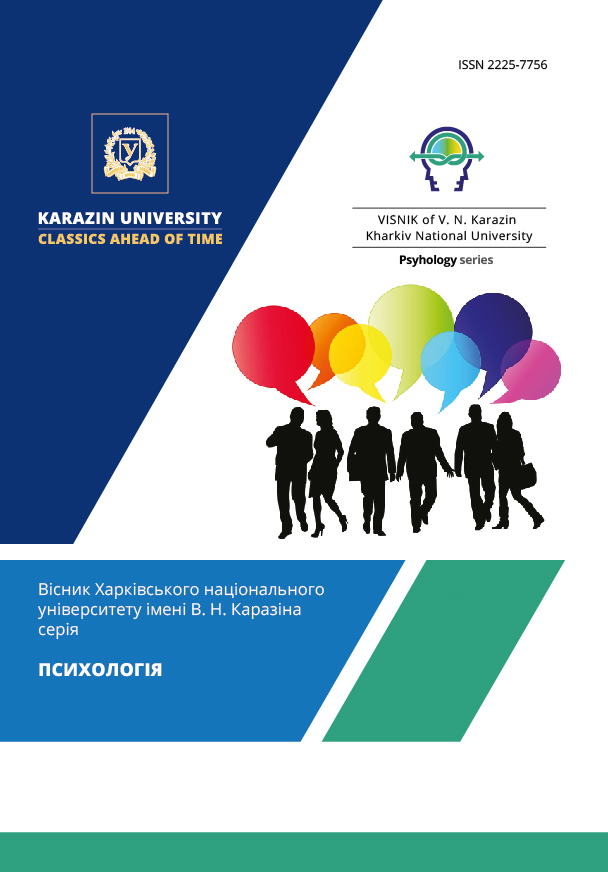FEATURES OF EXPERIENCING GUILT IN PEOPLE WITH DIFFERENT LEVELS OF PERSONAL MATURITY
Abstract
The study covers theoretical and empirical analysis of modern scientific approaches and theories concerning problems of individual’s precursors of feeling guilty. Personality maturity mentioned as a possible predictor of individual differences in experiencing guilt. Differences between guilt and guilt proneness are emphasized. Guilt proneness is a personality trait that is associated with predisposition to prosocial behavior. Guilt on the other hand is an uncomfortable moral emotion that can discourage the optimal functioning and well-being of an individual. Sixty two participants ages
from 21 to 55 years reported in a survey their own level of personality and emotional maturity, and differences in guilt and guilt proneness. The personality maturity was measured by “Questionnaire of personality maturity” (Shtepa O.S.), “Test of personality maturity” (Ruzhenkov V.A. etc.) and “Test of emotional maturity” (Kocharyan O.S. etc.). The level of guilt and guilt proneness was investigated by “Test of Self-Conscious Affect” (Tangney J.P.) and “Guilt Inventory” (Kugler K.E.). Findings of the study revealed that individuals with low personality maturity tend to guilt proneness as well as to feeling guilt. The study demonstrated negative correlations between guilt and emotional maturity, live philosophy, creativity, positive thinking and self-development; guilt proneness and emotional maturity, responsibility, live philosophy, sociability, self-acceptance, positive thinking and empathy. The original research hypothesis was confirmed and the findings demonstrate that there is an association between guilt proneness, guilt and personality and emotional maturity.
Downloads
References
Бьюдженталь Дж. Наука быть живым: диалоги между терапевтом и пациентом в гуманистической терапии / Дж. Бьюдженталь; пер. с англ. А. Фенько. – М. : «Класс», 1998. – 336 с.
Изард К. Э. Психология эмоций / К. Э. Изард. – СПб.: Питер, 2009. – 464 с. http://library.kpi.kharkov.ua/files/new_postupleniya/kerrolizard.pdf
Кон И.С. Социология личности/ И.С. Кон – М.: Политиздат., 1967 – 383 с.
Короткова Е. В. Социально-психологический анализ вины и стыда как системы отношений личности к себе и другому : дис. На соискание науч. степени канд. псих. наук : спец. 19.00.05 «Социальная психология» / Е. В. Короткова. – Ростов-на-Дону, 2002. – 226 с.
Леонтьев Д.А. Личностное в личности: личностный потенциал как основа самодетерминации/под ред. Б.С. Братуся, Д.А. Леонтьева // Ученые записки кафедры общей психологии МГУ им. М.В. Ломоносова. – М.: Смысл, 2002 – №1. – с. 56-65.
Макагон И. К. Апробация методики измерения чувства вины и стыда / И.К. Макагон, С.Н. Ениколопов // Теоретическая и экспериментальная психология. — 2015. — № 8. — С. 1–6. URL:https://cyberleninka.ru/article/n/aprobatsiya-metodiki-izmereniya-chuvstv-viny-i-styda-test-of-self-consciousaffect-3-tosca-3-tangney-j-p-dearing-r-l-wagnerp-e-gramzow-r-h/viewer
Півень М. А. Структурні особливості емоційної зрілості особистості: дис. на здобуття наук. ступеня канд. псих. наук : 19.00.01 «Загальна психологія, історія психології» / М.А. Півень. – Харків: НАУ імені М. Є. Жуковського «ХАІ», 2016. – 244 с. URL http://psychology.univer.kharkov.ua/16_17_doki/Piven_03/Piven_diss.pdf
Руженков В. А. Методика диагностики личностной зрелости / В. А. Руженков, В.В. Руженкова, И.С. Лукъянцева // Научные ведомости. – 2016. – №36. – С. 65–70. URL http://dspace.bsu.edu.ru/handle/123456789/20085
Столин В. В. Самосознание личности / В. В. Столин - М.: Издательство Московского Университета, 1983. - 284 с.
Сульдина М. Невротическое чувство вины как защитный механизм психики [Електронний ресурс] / М. Сульдина. – 2018. – Режим доступу до ресурсу: https://pikabu.ru/story/nevroticheskoe_chuvstvo_vinyi_kak_zashchitnyiy_mekhanizm_psikhiki_5856594.
Франкл В. Доктор и душа. Логотерапия и экзистенциальный анализ / В. Франкл; пер. с нем. Л.Б. Сумм, 2016. – 338 с. URL overead.ec/view_global.php?id=73483
Фрейд З. Я и Оно./ З. Фрейд; пер. с нем. В. Ф. Полянського, под ред. А.А. Франковского. - Л.: Academia, 1924. – 62 с.
Чебикін О.Я. Становлення емоційної зрілості особистості: монографія / О.Я. Чебикін, І.Г. Павлова. – Одеса: ПНЦ АПН України, 2009. – 238 с.
Штепа О. С. Особистісна зрілість: Модель. Опитувальник. Тренінг. Монографія / О. С. Штепа. – Львів: Видавничий центр ЛНУ імені Івана Франка, 2008. – 210 с.
Ялом И. Экзистенциальная психотерапия / И. Ялом; пер. с англ. Т.С. Драбкиной. — М.:Независимая фирма «Класс» – 1999. – 576 с.
Cohen T. R., Panter A. T., Turan N. (2012). Guilt Proneness and Moral Character / Current Directions in Psychological Science, 21, 355–359. Retrieved from: https://doi.org/10.1177%2F0963721412454874 [in English]
Miller, C. (2010). Guilt and helping. In A. Columbis (Ed.) Advances in Psychology Research: Vol.
Guilt and helping (pp. 117-138). Hauppauge, NY, USA: Nova Science Publishers. Retrieved from: http://users.wfu.edu/millerc/Guilt.pdf [in English]
Torstveit L., Sütterlin S., Lugo R. G. (2016). Empathy, Guilt Proneness, and Gender: Relative Contributions to Prosocial Behaviour / Europe`s Journal of Psychology, 12(2), 260–270. Retrieved from: https://doi.org/10.5964/ejop.v12i2.1097 [in English]




